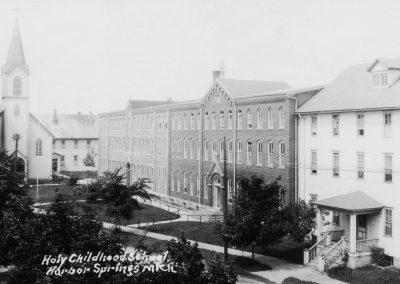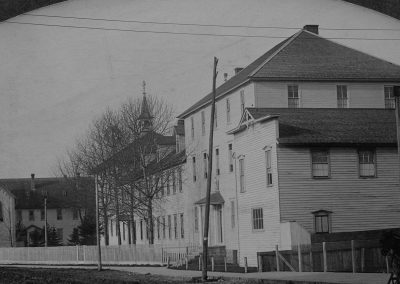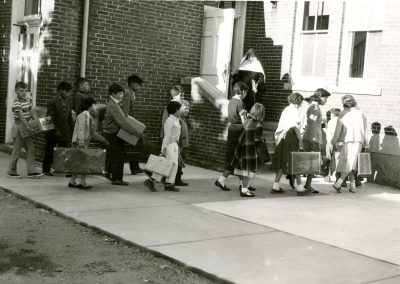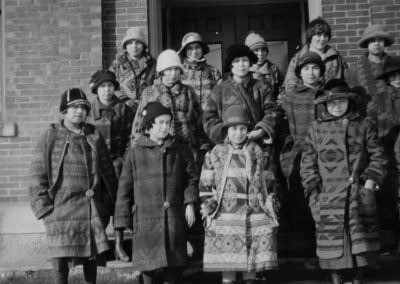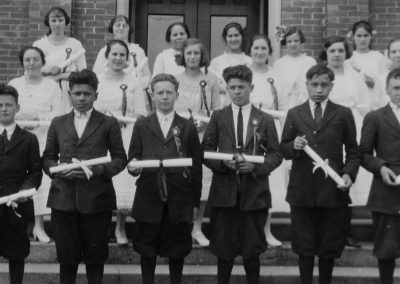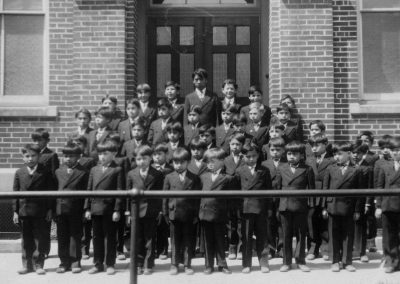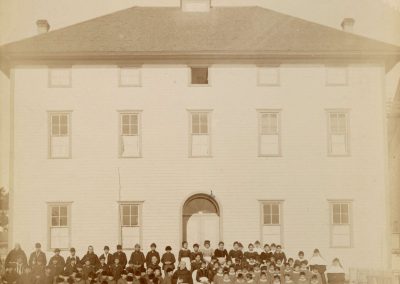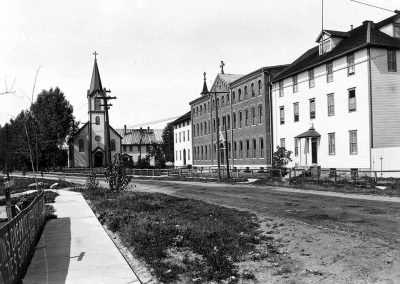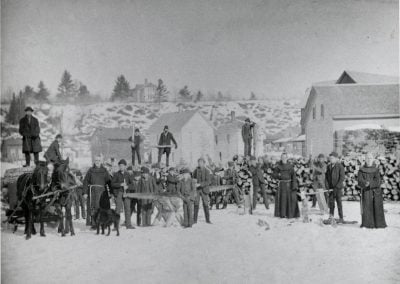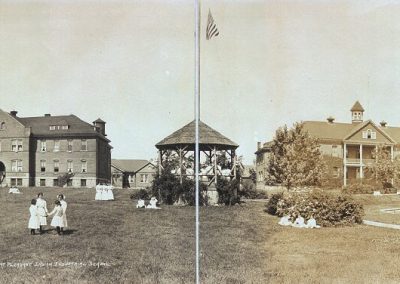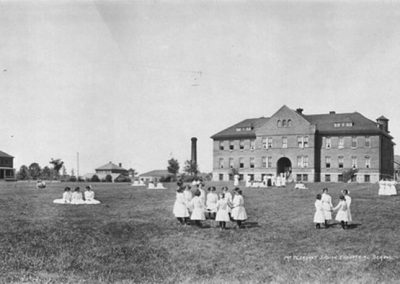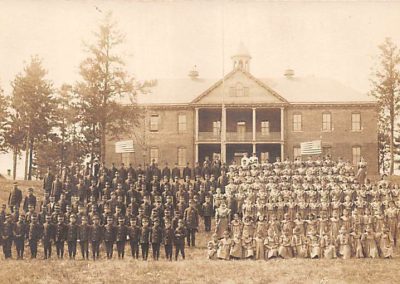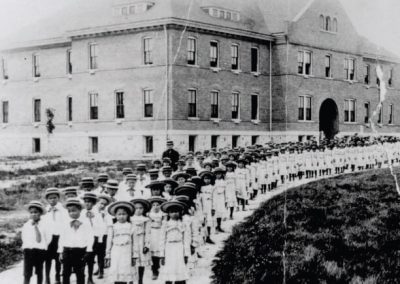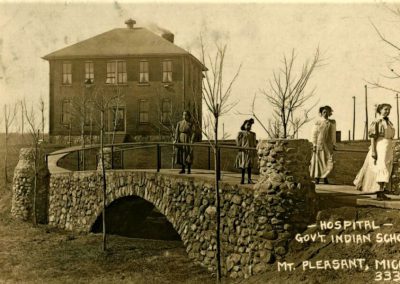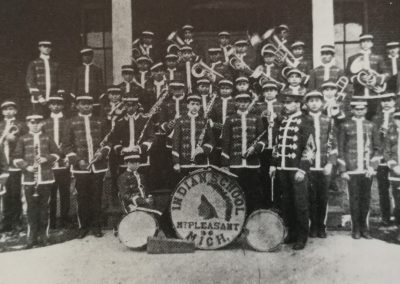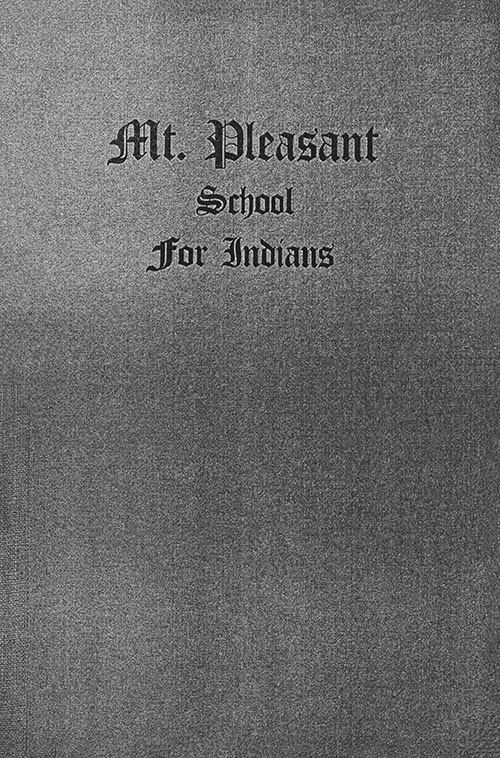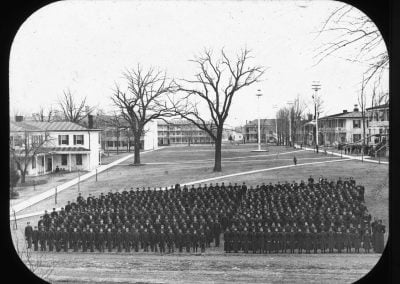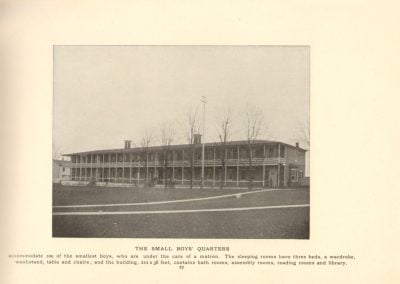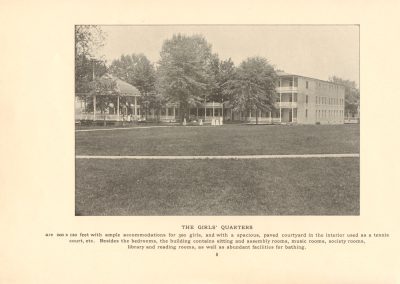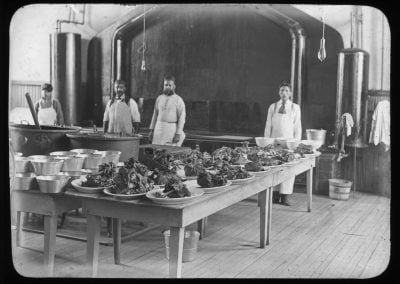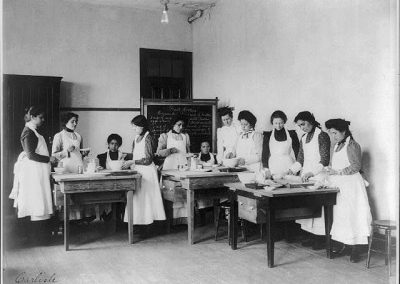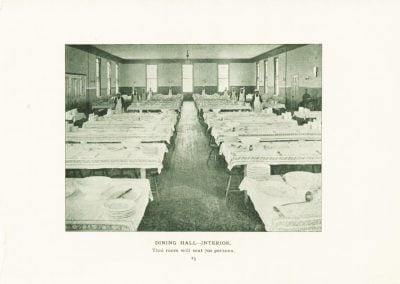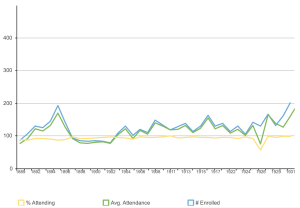Odawa Schools and Student Enrollment in Waganakising
Eric Hemenway
The displays in this section focus on five important schools attended by the Little Traverse Bay Bands of Odawa Indians (LTBB) living in Waganakising—the Land of the Crooked Tree—located in the counties of Emmet and Charlevoix in the northwest portion of the lower peninsula of Michigan. The first three displays provide a series of photographs for three of the boarding schools attended by LTBB students: Holy Childhood of Jesus Indian Boarding School operated by the Catholic Church in Harbor Springs, Michigan; the Mount Pleasant Indian School operated by the Bureau of Indian Affairs (BIA) in Mount Pleasant, Michigan; and the Carlisle Indian School operated by the BIA in Carlisle, Pennsylvania.
Photos from Holy Childhood of Jesus Indian Boarding School
Holy Childhood School, Harbor Springs, Mich.
Courtesy of Marquette University Archives, Bureau of Catholic Indian Missions Records, ID 00315. Department of Special Collections and University Archives, Marquette University Libraries.
Holy Childhood Church and School.
Courtesy of Marquette University Archives, Bureau of Catholic Indian Missions Records, ID 01043. Department of Special Collections and University Archives, Marquette University Libraries.
Arrival Holy Childhood (Circa 1955).
Courtesy of Little Traverse Bay Bands of Odawa Indians Archives.
Girls at school, 1920?
Courtesy of Marquette University Archives, Bureau of Catholic Indian Missions Records, ID 00311. Department of Special Collections and University Archives, Marquette University Libraries.
Graduates in Palmer Method Penmanship, VIII & IX Grade.
Courtesy of Marquette University Archives, Bureau of Catholic Indian Missions Records, ID 00310. Department of Special Collections and University Archives, Marquette University Libraries.
Holy Childhood School, Harbor Springs, Mich.
Courtesy of Marquette University Archives, Bureau of Catholic Indian Missions Records, ID 00317. Department of Special Collections and University Archives, Marquette University Libraries.
Holy Childhood (Circa 1893) boys and girls.
Courtesy of Little Traverse Bay Bands of Odawa Indians Archives.
Holy Childhood School and Dorm (Circa 1900).
Courtesy of Little Traverse Bay Bands of Odawa Indians Archives.
Photos and Book from Mount Pleasant Indian School
Students at Mt. Pleasant School (Postcard), 1909.
Courtesy of Little Traverse Bay Bands of Odawa Indians Archives.
Mt. Pleasant Government Indian School Hospital (Postcard).
Courtesy of Little Traverse Bay Bands of Odawa Indians Archives.
Photos from Carlisle Indian School
The fourth display provides information on Native student enrollment and attendance at the same three boarding schools. It also provides numbers of Native and non-Native students graduating from two high schools operated for the general public: Harbor Springs High School and Petoskey High School.
Numbers of Students Enrolled at, attending, and graduating from five schools
The following paragraphs provide documentation of the data provided in this fourth display.
I compiled data on student enrollment and attendance at Holy Childhood of Jesus Indian Boarding School from the following source: Commissioner of Indian Affairs Annual Reports, United States. Office of Indian Affairs. Annual reports of the Commissioner of Indian Affairs, for the years 1826-1932, Washington, D.C.: G.P.O. It is my judgement that the majority of students at Holy Childhood were Odawa with some Ojibway in attendance, as well as a very small number of students who were not Native. This judgement is based on my knowledge from 16 years of working within the LTBB Archives, as well as being Odawa and growing up in Waganakising. In addition, the school was located at Harbor Springs, which is a prominent historical village for the Little Traverse Bay Bands of Odawa Indians (LTBB) and located within the 1855 reservation of LTBB.
I compiled the data concerning the Mount Pleasant Indian School from the National Archives microfilm series M1996: Register of Pupils of the Mt. Pleasant Indian School, Mt. Pleasant Agency, Michigan, 1893-1932. The microfilm provided information about each student by family name, gender, and hometown. I compiled the data for the students of the Little Traverse Bay Bands of Odawa Indians (LTBB) attending Carlisle Indian School from records at the National Archives which have been digitized by Dickinson University: NARA RG 75, Series 1324. Carlisle Indian School Digital Resource Center (dickinson.edu). This Carlisle data source identified each student by tribal name/identity, family name, and hometown. I selected only students at Carlisle who were identified as Odawa (Ottawa) as potentially members of LTBB.
A crucial next step was determining if a student listed in the Mt. Pleasant file or an Odawa student in the Carlisle file was originally associated with the LTBB in Waganakising or came from somewhere else. Being from hometowns within the LTBB 1855 reservation and other historic towns/villages that are LTBB Odawa were critical pieces of information in determining if a student was LTBB. Family names were also key pieces of information in identifying students as LTBB. A primary source for LTBB names that I referenced is the Durant Roll National Archives Microcopy M2039, Correspondence, Field Notes, and the Census Roll of All Members or Descendents of Members Who Were on the Roll of the Ottawa and the Chippewa Tribes of Michigan in 1870, and Living on March 4, 1907 (Durant Roll, 4 rolls). I combined this information into a determination of a student being LTBB based on my knowledge of Odawa hometowns/villages and names from my 16 years of working within LTBB Archives, as well as being Odawa and growing up in Waganakising.
This process likely resulted in some LTBB students being categorized as non-LTBB and some non-LTBB students identified as LTBB. Some students excluded from the list of LTBB could in actuality be LTBB because many individual Odawa from Northern Michigan have family ties to both LTBB and Grand Traverse Band of Ottawa and Chippewa Indians. My process may have resulted in some of these students who could have been considered LTBB being categorized as Non-LTBB in this project. I am more confident that the students that are included on this list as LTBB are indeed associated with LTBB.
The fourth display also includes the number of students and the number of Native students in the graduating classes of the Harbor Springs High School and the Petoskey High School. Both Harbor Springs and Petoskey are located within the reservation of LTBB and two of the most prominent historic villages for LTBB. My source for the graduating classes of Harbor Springs High School was the public photos of the graduating classes of the high school. With the permission of the high school, I took pictures of the photos of the graduating classes. For Petoskey High School, I relied on digitized yearbooks located in the Petoskey Public Library, Petoskey, Michigan: Yearbooks – Petoskey District Library (petoskeylibrary.org).
For each high school, I counted the total number of students and the number who were Native in each graduating class. I categorized the students as Odawa or not Odawa based entirely on their names without taking into account appearance or dress. My ability to deduce the number of Odawa students for each class was based off of my being Odawa, growing up in the Odawa community of Little Traverse Bay Bands (LTBB, Waganakising) and working in LTBB Archives for 16 years. I also recognize that there is a very high possibility that some Odawa individuals were not counted as such due to my error of not recognizing that individual’s name as Native.

